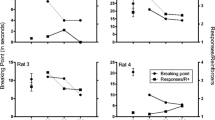Abstract
Key-pecking behavior of three pigeons was maintained by concurrent variable-interval, variable-interval schedules of reinforcement. Dose-response curves of amphetamine on four operants involved in the choice situation were obtained. None of the doses of amphetamine studied produced any rate-increasing effect on responding, irrespective of the differences in control baseline rates. Responding at the changeover key was relatively more depressed than main-key responding in spite of occuring at lower rates in non-drug conditions.
Similar content being viewed by others
References
Catania, A. C.: Concurrent performances: reinforcement interaction and response independence. J. exp. Anal. Behav.6, 253–263 (1963).
Clark, F. C.: The effect of deprivation and frequency of reinforcement on variable-interval responding. J. exp. Anal. Behav.1, 221–228 (1958).
Dews, P. B.: Studies on behavior IV. Stimulant actions of metaphetamine. J. Pharmacol. exp. Ther.122, 137–147 (1958).
Ferster, C. B., Skinner, B. F.: Schedules of reinforcement. New York: Appleton-Century-Crofts 1957.
Findley, J. D.: Preference and switching under concurrent scheduling. J. exp. Anal. Behav.1, 123–144 (1958).
Herrnstein, R. J.: Behavioral consequences of the removal of a discriminative stimulus associated with variable interval reinforcement. Unpublished doctoral dissertation, Harvard University 1955.
—: Relative and absolute strength of response as a function of frequency of reinforcement. J. exp. Anal. Behav.4, 267–272 (1961).
—: On the law of effect. J. exp. Anal. Behav.1–3, 243–266 (1970).
Kelleher, R. T., Morse, W. H.: Determinants of the specificity of behavioral effects of drugs. Ergebn. Physiol.60, 1–56 (1968).
Pliskoff, S. S.: Effects of symmetrical and assymmetrical changeover delays on concurrent performances. J. exp. Anal. Behav.16, 249–256 (1971).
Shull, R. L., Pliskoff, S. S.: Changeover delay and concurrent schedules: some effects on relative performance measures. J. exp. Anal. Behav.10, 517–527 (1967).
Skinner, B. F.: Are theories of learning necessary? Psychol. Rev.57, 193–216 (1950).
Todorov, J. C.: Concurrent performances: effect of punishment contingent on the switching response. J. exp. Anal. Behav.16, 51–62 (1971).
Wilson, M. P.: Periodic reinforcement interval and number of periodic reinforcements as parameters of response strength. J. comp. physiol. Psychol.47, 51–56 (1954).
Author information
Authors and Affiliations
Rights and permissions
About this article
Cite this article
Todorov, J.C., Gorayeb, S.R.P., CorrÊa, D.L. et al. Effects of amphetamine on choice behavior of pigeons. Psychopharmacologia 26, 395–400 (1972). https://doi.org/10.1007/BF00421905
Received:
Revised:
Issue Date:
DOI: https://doi.org/10.1007/BF00421905




